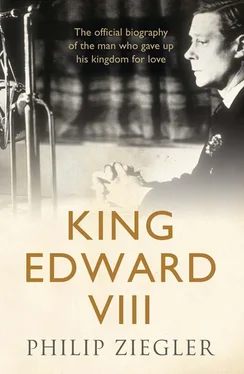THE PRINCE OF WALES’S EXPEDITION TO THE MIDDLE EAST proved a welcome break in the four black years that he spent on the Western Front. He would not have been the man he was if he had not striven to diminish his pleasure by endless doubts and self-accusations. ‘I feel such a swine having a soft comfortable time out here while the Guards Division is up at Ypres,’ he told Lady Coke; 1and he found little comfort in the knowledge that he would never have been allowed near the battle himself and that his presence with the allied forces in the Canal Zone was a badly needed boost to the morale of those who felt themselves to be members of a forgotten army.
His last days in London had been hectic. He called on Kitchener to get his instructions – ‘He talked a lot, quite interesting in a way, but I’m frightened of the man’ 2– acquired the mountain of impedimenta thought necessary for such a journey, and spent the last night in mingled work and revelry. He, Prince Albert and Godfrey Thomas, recorded the latter, ‘played the gramophone till the small hours and when we thought it was time for some song that we hadn’t got among the records, we were obliged to sing it. After a lot of exercise dancing round and round the room, Prince Bertie proceeded to go to bed, but his brother got into his bed with all his clothes on, so by the time he’d been pulled out by us, there wasn’t much left of the bed … So we turned the gramophone on again. I got away just before two. HRH was starting at 9 the next morning, and had done practically no packing as usual, and also had about 20 letters to write. The result, as I heard afterwards, was that he had exactly 1¼ hours sleep that night and went off without any breakfast, which is entirely typical.’ Thomas got this last information in a letter from Prince Albert, who added: ‘A wonderful chap. I don’t know how he does it, do you?’ 3
The King had been convinced that even in comparatively temperate March the Prince would find the heat in the Canal Zone intolerable, but his son relished hot weather and was inspired by it to undertake still more strenuous physical exercise. He enjoyed the life in Ismalia, ‘strafing up and down the Canal’, visiting the troops and preparing a report on the supply system. On his first day at GHQ he went to hear General Birdwood address the Australian and New Zealand Brigades. His presence was announced to the men, ‘at which they gave 3 cheers, bloody fools!!’ 4At first he had been slightly deterred by their reputation for drunkenness and indiscipline but he was quickly overwhelmed by their exuberance; they had committed undreamt-of atrocities in the red-light districts of Cairo and Alexandria, but ‘they have fought so d—d hard and are so keen, that it is hard to deal severely with them’. What moved him most was the ‘marvellous imperial spirit’ that had called them up, ‘for they aren’t fighting for themselves or their own country either; only for the Empire’. ‘As you know,’ he told his friend Captain Bailey, ‘I’m not often given to these highflown ideas, but really these Anzacs have impressed me so much!!’ 5On the banks of the Suez Canal the Prince conceived a reverence for the idea of Empire that was to sustain him during the rigorous tours that lay ahead.
Not everyone reciprocated his enthusiasm. Among the many men he spoke to when he visited the Anzac troops at Tel-el-Kebir, was John Monash, a Brigadier General who had been one of the heroes of Gallipoli and was to become the most prominent Australian soldier of the First World War. ‘What he said to me was “M-m-m-m”,’ wrote Monash. ‘The fact was the youngster was completely bewildered, and most evidently ill at ease.’ 6His was a minority voice, however; every other account of the visit was lyrical in tone. Birdwood maintained that the men took him to their hearts; the Prince’s equerry, Malcolm Murray, spoke of the warmth of their reception – ‘They would rush across to wherever the Prince was coming up, make a line for him and cheer time after time.’ 7One eye-witness account was passed on at third hand to Queen Mary: ‘… the enthusiasm knew no bounds, and the cheering was perfectly overwhelming. Our friend said that men looked at him so intently that they forgot to salute! and added “I’m not exaggerating when I say that some of them gazed at him with tears rolling down their cheeks.”’ 8
The Prince of Wales had been in crowds many times before, but this was the first time that he had experienced the adulation that was so often to be his lot over the next twenty years. It could be argued that any young, personable and smiling prince would have had the same effect. The contrary can hardly be proved, but so many reports by men and women who prided themselves on being not easily impressed testify to the extraordinary potency of his personality that it is impossible to dismiss them all. To the seasoned veterans of Gallipoli his youth, charm, simplicity and friendliness, his patent sincerity and concern for their wellbeing, proved irresistible. Many millions were to find the same combination as effective in the future.
For the Prince it was exhilarating, disconcerting and slightly alarming. He for his part had no doubt that it was his royal blood and not his personal qualities which won him such applause. The idea displeased him. ‘Oh!! to be out here privately and not as the P of W,’ he moaned to Godfrey Thomas. ‘That’s what ruins my life and ever will!!!!’ This particular complaint was provoked by a projected visit to Khartoum. He had pleaded to be allowed to go there but typically at once began to have doubts once permission had been conceded. If he could have gone as a common tourist he would have been delighted, but he was travelling officially as heir to the throne: ‘You know how I hate all those bulls at any time, so think how odious it is to me in wartime!!’ 9In the Governor – the Sirdar – Reginald Wingate, he found a man determined to milk the situation to the last drop: ‘A little snob,’ he called him in his diary; ‘He is HRHing the whole time and never relaxes a moment.’ 10Yet he had to admit that Wingate knew his job superlatively well and that the pomp was well deployed to make the greatest possible impression on the Sudanese. ‘I am throwing my heart and soul into it all to make it a success, though it goes against the grain,’ he told his father. 11To Malcolm Murray it sometimes seemed that heart and soul were not as energetically deployed as might have been hoped for. The Prince, he complained to Stamfordham, ‘always wanted to efface himself, and hates any kind of formal thing. This is exactly what he wants practice in – he is rather naughty about going up to speak to people etc.’ 12
The Prince’s always weak stomach for sightseeing was quickly over-taxed. Even before he reached Luxor on his return journey down the Nile he was confessing in his diary: ‘I’m utterly fed up with visiting temples and never want to see another one again.’ He found an itinerant snake-charmer decidedly more interesting than Karnak by moonlight. The ancient and eminent Egyptologist Professor Le Grain lavished his learning on the young visitor but gained little gratitude for his pains. ‘I wasn’t sorry to see him go, for he … nearly killed me with his detailed descriptions.’ 13It is unlikely, however, that the professor guessed how little pleasure he had given; the Prince’s manners rarely fell below excellence and he would have gone to great pains to put a good face on his sufferings. When Ronald Storrs conducted the Prince round Cairo a few days later, he wrote that he had never met a visitor ‘who entered more swiftly into the spirit of the place … I have met none with equal vitality or with more appreciation of Eastern life’. 14Perhaps Storrs was a more congenial cicerone than the professor, certainly the Prince found Cairo much jollier than the Upper Nile and agitated to be allowed to pay it a second visit. The King for some reason objected and the Prince wrote in injured innocence: ‘I don’t want to go galivanting about in Cairo, far from it. I’m not even going to ask you for a night there … just a few hours so that I may go to the bazaars and do some shopping for you and Mama.’ 15
Читать дальше












